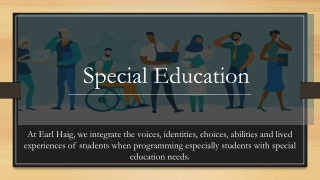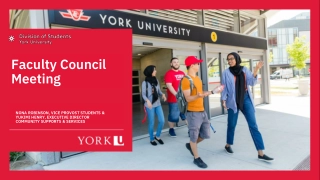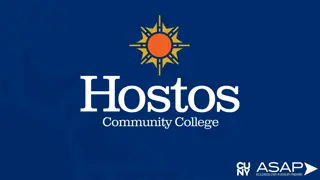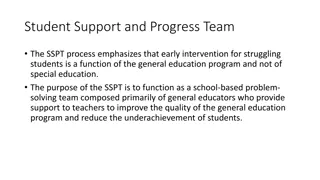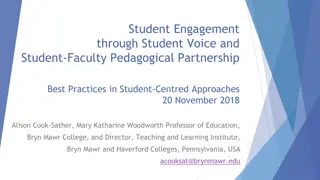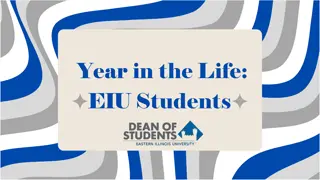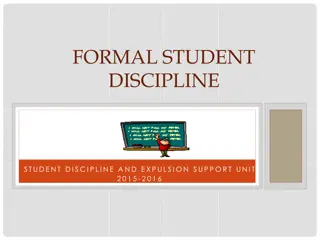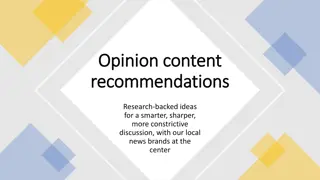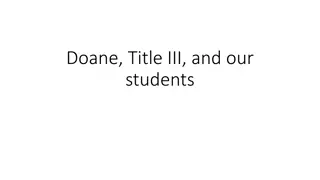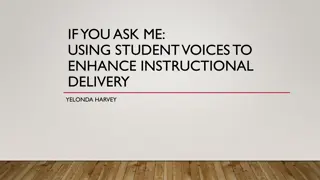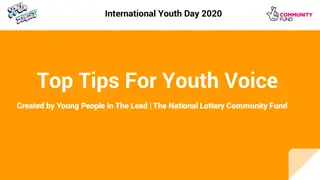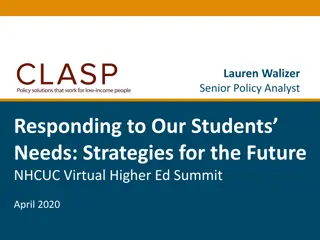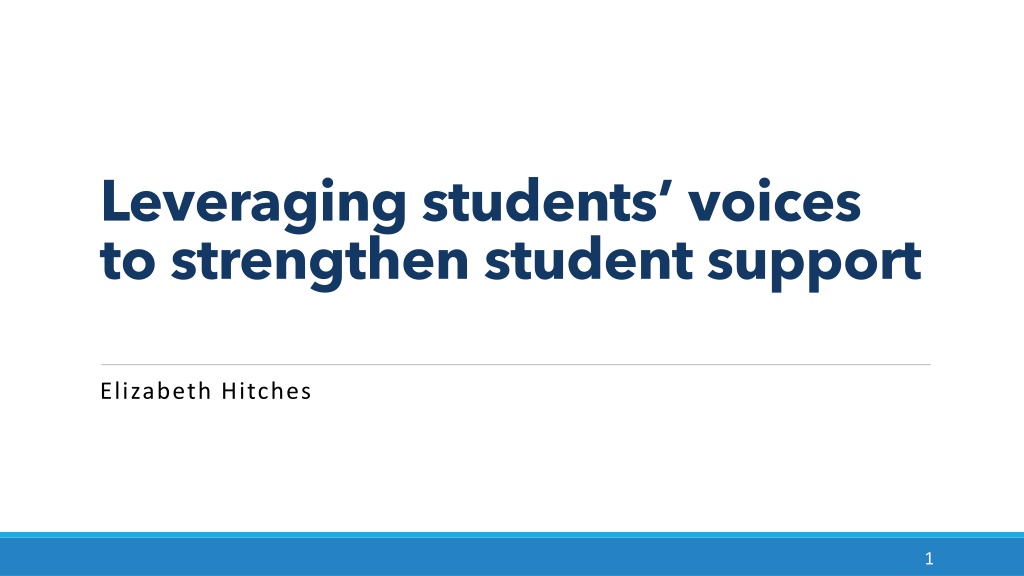
Strengthening Student Support Through Student Voices
This webinar by Elizabeth Hitches emphasizes the importance of leveraging student voices to enhance student support in educational settings. The content discusses acknowledging indigenous lands, self-care reminders, inclusive language practices, terminology related to students with additional needs/disabilities, challenges faced by students, legal obligations of universities to provide accommodations, and the overall goal of ensuring equitable access and opportunities for all students.
Download Presentation

Please find below an Image/Link to download the presentation.
The content on the website is provided AS IS for your information and personal use only. It may not be sold, licensed, or shared on other websites without obtaining consent from the author. If you encounter any issues during the download, it is possible that the publisher has removed the file from their server.
You are allowed to download the files provided on this website for personal or commercial use, subject to the condition that they are used lawfully. All files are the property of their respective owners.
The content on the website is provided AS IS for your information and personal use only. It may not be sold, licensed, or shared on other websites without obtaining consent from the author.
E N D
Presentation Transcript
Leveraging students voices to strengthen student support Elizabeth Hitches 1
I acknowledge that I am presenting this webinar from the lands of the Darug/Dharug people. I acknowledge the Traditional Custodians of the various lands on which we are all joining from today. I would also like to recognise their valuable contributions to Australian and global society. Acknowledgement of Country I pay my respects to their Ancestors and their descendants, who continue cultural and spiritual connections to Country. I acknowledge Aboriginal and Torres Strait Islander people participating in this webinar. 2
Self-care reminder Feel free to take a break at any time Lifeline Call: 13 11 14 Online for text and webchat: https://www.lifeline.org.au/about/contact-us/ 3
A note on language Person-first language is used in this webinar Support individuals personal preferences, including identity-first language Not all students typically grouped under the term disability will identify as having a disability Conversation in this space is welcomed! 4
A note on terminology Students with additional needs and/or disabilities (AND): students whose needs may make them eligible for academic accommodation or accessibility support students who identify as having a disability students with learning difficulties, chronic illness, illness, or difficult personal circumstances 5
Within the structures and timeframes set by post- secondary institutions, students with AND may experience challenges The importance of equitable access and opportunity for all Accessing learning resources Participating to their full potential Performing at the level they are capable (See Grimes et al., 2019; Hong, 2015; Osborne, 2019) 6
Universities are legally required to provide reasonable adjustments or accommodations Why ensure equitable access and opportunity for all? It s in all of our best interests for students to succeed and reach their personal potential 7
Student Support in Post-Secondary Education What we know 8
Accessing student support Services can be in high demand (Cathcart, 2016; Pech, 2017) Resources can be limited (e.g., student to staff ratio; consultations available) (Stallman, 2012) Obtaining medical evidence is not always easy (e.g., can carry financial costs) (see Martin 2010; Karimshah et al., 2013) 9
Accessing student support (2) Support seeking hindered by: limited knowledge of services (Beccaria et al., 2016) feeling guilt (Martin, 2010) fear of stigma (Hussain et al., 2013) Some students only seek support when experiencing severe distress (Kambouropoulos, 2014; Vivekanda et al., 2011) 10
Experiencing student support in Australia Limited studies examining student support for students with AND (see Hitches, 2021) Using support services helped a number of students: succeed during challenges (Drury & Charles, 2016) progress with their studies (Oliver et al., 2016) support wellbeing (Couzens et al., 2015) 11
Experiencing student support in Australia (2) For others, the support may not sufficiently cater to their needs partially catering to needs (Earnest, 2010; Serry et al., 2018) inconsistent or limited targeted support (Hughes et al., 2016; Serry et al., 2018) Several studies advocate for a more student-centred approach - listening to students perspectives (see Anderson et al., 2018; Heagney & Benson, 2017; Serry et al., 2018) 12
Leveraging students voices The current study 13
About this study Student survey Anonymous Participants: 60 students Received support from student support services (now or in past) AND (now or in past; one type or combination) 14
Survey questions Broad demographic questions (age category, gender, year of study, AND experienced) Open-response questions: Please explain how effective the support was in accommodating your needs What were the positives of the support service for you? What were the negatives of the support service for you? Do you feel that there was any support that was not offered, that would have been beneficial to you? Were there any areas of the support service that could be improved upon? 15
Personalised and student-centred Effective and/or Positive Accessible Fosters student agency and empowerment 16
Effective/Positive: Personalised and student-centred support Feeling their needs were understood by staff and responded to in an individualised way feeling understood and being accommodated for a personal plan feeling that my issues were recognised being fairly treated it was flexible to my needs and was understanding to the circumstances 17
Effective/Positive: Personalised and student-centred support (2) A feeling of care showed that they cared compassionate to my situation Receiving personal communication and follow-up very effective! I received regular check ins to see how I m travelling personal contact and care 18
Effective/Positive: Personalised and student-centred support (3) Assessment accommodations which catered to students needs quiet rooms with fewer people extra time software ; computer to take final exam reader-writer Outside of accessibility accommodations, students also mentioned extensions : providing time to complete my work alleviating the pressure for me and allowed me to have enough time to recover as well as still do well in the subject 19
Effective/Positive: Accessible support Feeling staff were approachable and willing to help I felt like [the staff member] was there for me and wanted to help friendly , nice , willing , supportive Timely access seen rapidly a great help when I desperately needed assistance 20
Effective/Positive: Accessible support (2) Communication with teaching staff enhanced accessibility, aided support delivery contacted unit coordinators for me contacting the convenor University support services free and credible free service (very unlikely I would/could have used it otherwise) with educated practitioners 21
Effective/Positive: Student agency and empowerment Facilitated informed decision making gave me some informed opinion/perspective helpful contacts and advice for short-term action. Developing a strategy of plan with the service gave me a go to for issues. Had a plan strategies I can work on for the rest of my life 22
Effective/Positive: Student agency and empowerment (2) Reduce or manage stress manage stress. Big improvement over the semester I saw them took a lot of stress off, which allowed me to focus on my studies more Supported students belief in themselves and their ability to pursue their goals helped me to believe in myself encouraged me not to give up on my degree and goals in life 23
Effective/Positive: Student agency and empowerment (3) For students experiencing difficult circumstances, provided an outsiders perspective or non-judgmental listener neutral third party no bias a different perspective someone to listen and not judge 24
Lacking personalised and student-centred support Ineffective and/or Negative Challenges to accessible support Limited support of student agency and empowerment 25
Ineffective/negative: Lacking personalised and student-centred support Feeling the support was generalized and didn t suit their particular needs quite generalised didn't actually suit what I was struggling with wasn't accommodation for different strategies assumption that all illness of one type is the same 26
Ineffective/negative: Lacking personalised and student-centred support (2) For some students with chronic illness, feeling they needed to fit into predefined boxes to access support there was a category which I didn't meet of being able to get lecture or tutorial notes because the condition I had didn't involve not being able to write. This was not fair because even though I can write my condition meant I couldn't even get out of bed in order to make the notes I needed when first getting support I felt there was no compassion basically do you fit our boxes 27
Ineffective/negative: Lacking personalised and student-centred support (3) For some students with chronic illness, lacking accommodations beyond exam provisions did not help me during the semester often need to take a day off from tutorials no support in helping get any missed notes or information needed meant to have morning classes but this was out of [the service s] control 28
Ineffective/negative: Challenges for accessibility Waiting time they showed that they cared, but responded so late that it was hardly useful they were clearly really busy and didn't have a lot of time to help long waiting time (2 plus weeks) NON AVAILABILITY of appointments my emails weren t returned when I needed the support 29
Ineffective/negative: Challenges for accessibility (2) Difficult processes initially accessing support from the service they wanted highly detailed medical history a lot of paperwork required Difficult processes accessing extensions and disruption to studies having to provide constant medical certificates for the same condition when I needed extensions. I was in hospital if you submit disruptions late you can t [get extensions] did not help with locating/filling out documentation 30
Ineffective/negative: Challenges for accessibility (3) Leading to teaching staff providing alternatives a low-key arrangement with tutors [which] worked well I approached tutors They were very supportive sent email request and attached medical certificates 31
Ineffective/negative: Challenges for accessibility (4) Perceived limited communication between the service and teaching staff feels like a waste of time and energy because there is no communication to convenors or tutors didn't coordinate well with other services like helping me contact the services to get extensions Accessible in the short term, but no ongoing support concluded and had no follow up or intent of ongoing support . short term fixes for my needs but didn't extend the support over a long period of time 32
Ineffective/negative: Challenges for accessibility (5) Feeling intimidated or that services were unapproachable a bit intimidated uncomfortable, sometimes not meant to be judgement but judgement 33
Ineffective/negative: Challenges for student agency and empowerment Receiving limited information and guidance, making it difficult to make informed decisions or take necessary actions no extensive knowledge of how to fix my problems at uni. They seemed as in the dark as me needed more guidance on what best to do in my situation support was there but I was still left confused as to what to do 34
Provide personalised and student-centred support Students Suggested Improvements Improve the accessibility of support Support student agency and empowerment 35
Suggestion: Provide personalised and student-centred support Increase the level of understanding and responsiveness to students individual needs more personalised plan and special considerations offered more understanding from first contact because I am sick, I am already stressed 36
Suggestion: Provide personalised and student-centred support (2) For students with chronic illness or illness: Increase support when students are unable to attend classes Need to be able to do make up work or access notes an option for flexibility on tutorial attendance. One time I fainted before class and lay on the floor all class just so I didn't fail . Examine eligibility criteria for accommodations look into the categories people fall in more closely (not at superficial level ), have meeting with students to make sure their needs are being catered for 37
Content warning The following slide contains reference to material which may be distressing Lifeline Call: 13 11 14 Online for text and webchat: https://www.lifeline.org.au/about/contact-us/ 38
Suggestion: Provide personalised and student-centred support (3) Personal communication and follow-up a follow-up of people who access the service, to check on their progress and to provide additional support if needed having someone catch up with me later on to make sure I was ok Of concern: a call back especially for peeps who might be suicidal and don't turn up to a session [increased communication with the service] for those who had severe issues and might be on the verge of harm to themselves or others after sitting and hashing out their issues Lifeline Call: 13 11 14 Online: https://www.lifeline.org.au/about/contact-us/ 39
Suggestion: Improve accessibility Timely access speed of the process time to help organisation and appointments. More staff 40
Suggestion: Improve accessibility (2) Improve processes for receiving extensions extensions offered without getting a medical certificate every time would have been helpful as this process was very time consuming for me paperwork required for extensions - sometimes easier to just hand in something incomplete than to go through the system Ongoing support for students with chronic illness long term assistance 41
Suggestion: Improve accessibility (3) Communication with teaching and university staff communication within the university so you don't have to explain yourself every other day. coordination. E.g. everyone wanted to help but they often didn't work together well. Like the people organising my extensions then communicating with my tutors would have to explain myself as much and lecturer could more easily see what educational support I need 42
Suggestion: Improve accessibility (4) Approachability there's something quite professional/sterile about the offices that make it intimidating to go into to ask questions/ make appointments 43
Suggestion: Support student agency and empowerment Information provided it would have been beneficial to have been told the correct information from the outset information given Implied need to support student agency and empowerment Question: Is there any support you did not receive which would have been beneficial to you? Answer: yes. A lot. But can't think of specific.... It just simply is not offered for someone who doesn't know it's not explained 44
Leveraging students suggestions What might we explore to enhance and strengthen student support? 45
Why leverage? High leverage versus low leverage (Senge, 1990) Insider s perspective 46
Strengthening personalised and student-centred support 1. Continue providing effective academic accommodations (e.g., exam provisions) 2. Provide a feeling of care supported through personal communication and follow-up with students 47
Strengthening personalised and student-centred support (2) 3. Ensure all students specific and unique needs are understood and responded to in an individualised way Ongoing discussion with students may assist 4. Consider how we might organise accommodations to assist students with chronic illness when absent from classes How might teaching staff enact this? (Perhaps a UDL approach?) 48
Strengthening accessibility 1. Provide a feeling of approachability and a willingness to help 2. Consider how communication between students, the service, and teaching staff, can further aid support delivery ensure students are aware of this communication, and of what may help reduce their feeling the need for repeated disclosure to others (where this is distressing) 49
Strengthening accessibility (2) 3. Consider how we may streamline difficult special consideration processes (e.g. extensions) for students registered for ongoing support with the support services. Could we explore simple ways to grant extensions to those with ongoing needs already validated by the service? 4. Consider how processes can be strengthen to provide timely access to support and timely responses to students 50

